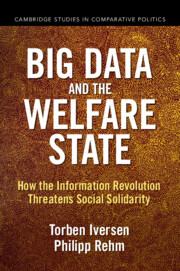Book contents
- Big Data and the Welfare State
- Cambridge Studies in Comparative Politics
- Big Data and the Welfare State
- Copyright page
- Dedication
- Contents
- Figures
- Tables
- Acknowledgments
- 1 Introduction
- 2 Theoretical Framework
- 3 A Brief Analytical History of Social Protection
- 4 Private Markets for Life and Health Insurance
- 5 Credit Markets
- 6 Labor Market Risks
- 7 Conclusion
- References
- Index
- Cambridge Studies in Comparative Politics
2 - Theoretical Framework
Published online by Cambridge University Press: 25 May 2022
- Big Data and the Welfare State
- Cambridge Studies in Comparative Politics
- Big Data and the Welfare State
- Copyright page
- Dedication
- Contents
- Figures
- Tables
- Acknowledgments
- 1 Introduction
- 2 Theoretical Framework
- 3 A Brief Analytical History of Social Protection
- 4 Private Markets for Life and Health Insurance
- 5 Credit Markets
- 6 Labor Market Risks
- 7 Conclusion
- References
- Index
- Cambridge Studies in Comparative Politics
Summary
Chapter 2 presents the (formal) theoretical framework and advances four arguments. First, whether or not majority support for public provision of insurance exists depends on the distribution of information. Second, some insurance is best provided via pay-as-you-go systems, but these involve a difficult time-inconsistency problem that private markets cannot solve. Some social insurance is therefore bound to remain almost entirely within the purview of the state. Third, people’s preferences regarding social insurance are also a function of the availability of private options. If social insurance is the only game in town, even those subsidizing the system will support it, leading to broad cross-class majorities. With private alternatives, the better-off will lower their support for public spending, which erodes the broad support public social policy programs traditionally enjoy. Fourth, parties continue to matter because they represent different risk groups, and we expect that partisan conflicts will extend into new areas, most importantly the regulation of information and how it may be used.
Keywords
- Type
- Chapter
- Information
- Big Data and the Welfare StateHow the Information Revolution Threatens Social Solidarity, pp. 15 - 43Publisher: Cambridge University PressPrint publication year: 2022



